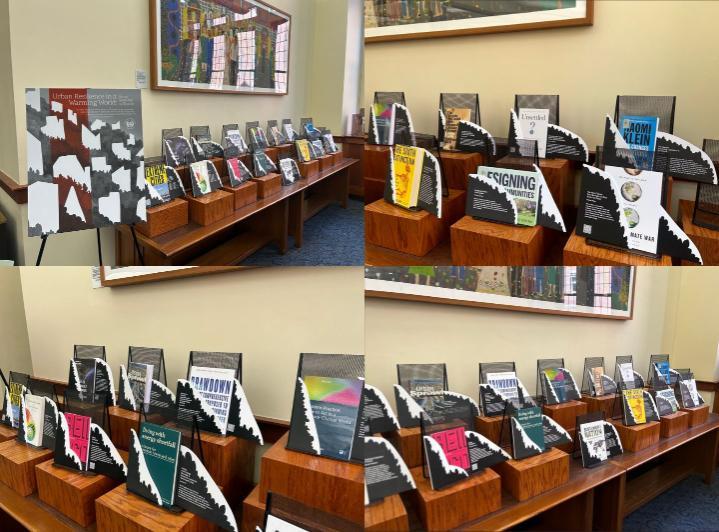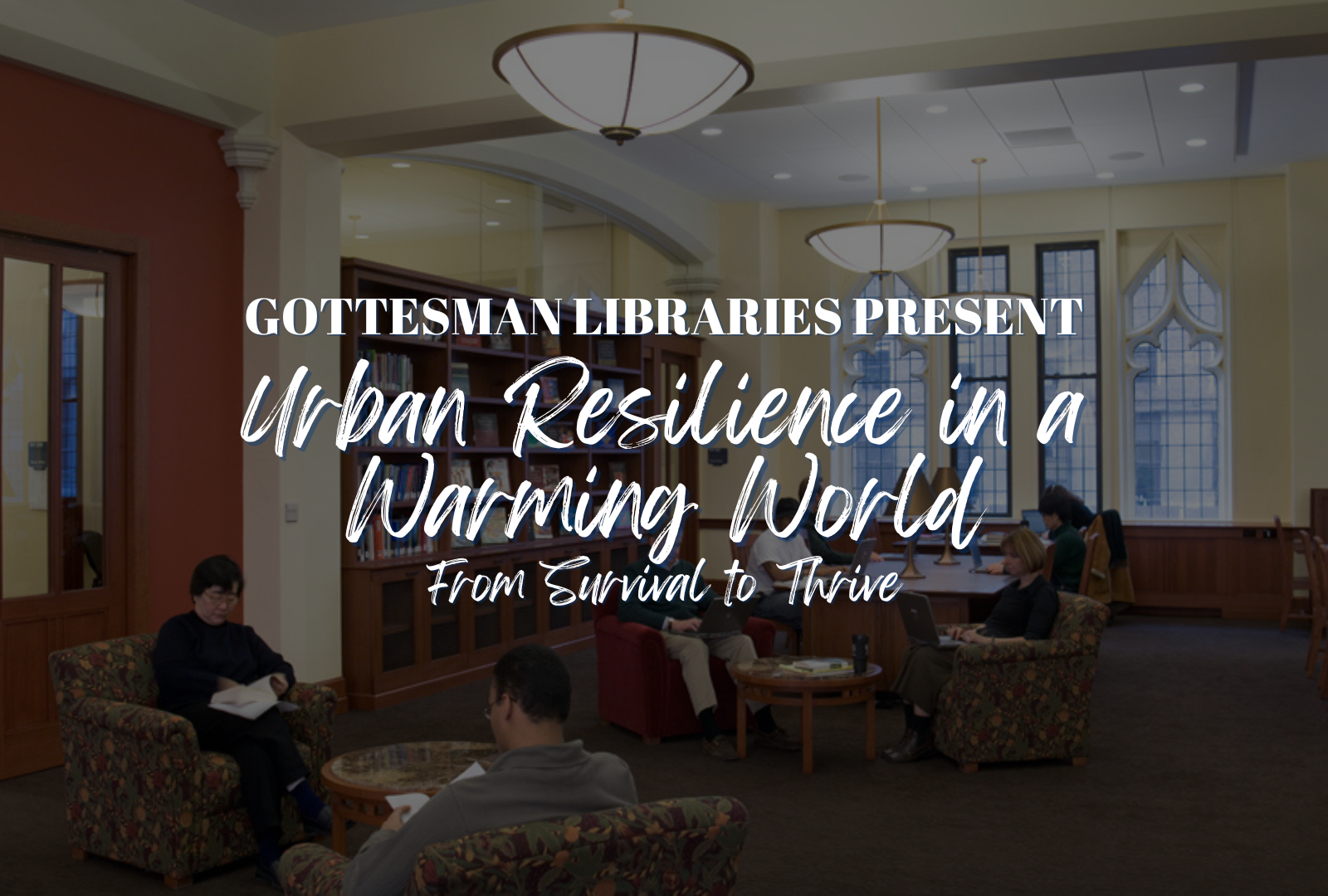During the month of September 2024, the Gottesman Libraries at Teachers College displayed a special collection titled, Urban Resilience in a Warming World: From Survival to Thrive. This collection was curated by Yousif Adam and designed by Ashley Wang and showcased literature on climate change, sustainability, and urban resilience. These works presented the effects of climate change on urban environments while offering key insights for adaptation solutions. Click here to access additional resources on climate change communication and education.

The books in the collection included:
Elizabeth Kolbert. The Sixth Extinction: An Unnatural History (2014)
Kolbert examines the current mass extinction caused by human activities, drawing parallels to five previous extinctions in Earth's history. Through scientific research and field studies, she showcases species at risk and explains how climate change, habitat destruction, and pollution are accelerating biodiversity loss. The book serves as a warning about humanity's role in shaping the planet's future and their irreversible damage to ecosystems.
Naomi Klein. This Changes Everything: Capitalism vs. the Climate (2015)
Klein argues that capitalism, with its focus on relentless growth and profit, is incompatible with addressing climate change. She advocates for a fundamental restructuring of the global economic system to prioritize sustainability and social justice over corporate interests. The book connects climate activism with broader movements for economic and social equity, emphasizing the urgency for systemic change.
David Wallace-Wells. The Uninhabitable Earth: Life After Warming (2019)
Wallace-Wells paints the dire future impacts of climate change, from rising temperatures and sea levels to widespread societal collapse. He compiles scientific predictions to outline the catastrophic consequences of inaction. The book serves as a call to action, urging for immediate efforts to mitigate climate disaster.
Ashley Dawson. Extreme Cities: The Peril and Promise of Urban Life in the Age of Climate Change (2017)
Dawson explores how cities are both highly vulnerable to climate change and central to finding solutions. He critiques current urban planning and development practices that exacerbate social inequalities, especially in coastal and low-income areas. The book emphasizes the need for cities to embrace more equitable and sustainable models to withstand future climate challenges.
Richard J. Jackson. Designing Healthy Communities (2012)
Jackson highlights the relationship between urban design and public health, advocating for built environments that promote physical and mental well-being. He examines how poor urban planning contributes to health crises like obesity, asthma, and social isolation. The book calls for redesigning communities to foster healthier lifestyles through better infrastructure and green spaces.
Ray Ison. Systems Practice: How to Act in a Climate-Change World (2010)
Ison presents systems thinking as a framework for addressing complex global challenges, including climate change. He advocates for a holistic approach to problem-solving that moves beyond isolated interventions. The book provides practical approaches for fostering collaborative, adaptive action in a rapidly changing world.
Jon Van Til. Living with Energy Shortfall: A Future for American Towns and Cities (1982)
Van Til explores how energy scarcity will reshape America's cities and towns, calling for sustainable, local solutions to the energy crisis. He highlights the need for adaptive infrastructure and community resilience in facing the limits of fossil fuel dependence. The book offers insights into the potential for energy efficiency and alternative energy sources to transform urban life.
Gregory D. Squires. Urban Sprawl: Causes, Consequences, & Policy Responses (2002)
Squires examines the drivers behind urban sprawl and its impact on the environment, social inequality, and public health. He critiques policies that have enabled uncontrolled suburban expansion and advocates for more sustainable urban planning strategies.
Jeffrey D. Sachs. The Age of Sustainable Development (2015)
Sachs presents a comprehensive overview of sustainable development, focusing on the intersection of economic growth, environmentalism, and social inclusion. He outlines the key challenges facing humanity, including climate change, poverty, and resource depletion, while proposing solutions based on global cooperation and scientific innovation. The book serves as a blueprint for achieving the United Nations' Sustainable Development Goals (SDGs).
Timothy Morton. Being Ecological (2018)
Morton offers a philosophical exploration of ecology, challenging traditional views of nature and environmentalism. He encourages readers to think beyond the human-nature relationship and embrace a more interconnected, understanding of life on Earth.
Steven E. Koonin. Unsettled: What Climate Science Tells Us, What It Doesn’t, and Why It Matters (2021)
Koonin questions the prevailing consensus on climate change, arguing that climate science is more uncertain than often portrayed. He critically examines the limitations of climate models and data, calling for a more nuanced public discourse around climate policy.
Michael Mann. The New Climate War: The Fight to Take Back Our Planet (2021)
Mann explores how the climate crisis has shifted from denial to more subtle forms of deflection by powerful interests such as the fossil fuel industry. He advocates for renewed activism and political action to counter false solutions. The book emphasizes the need for systemic change and collective action to combat climate change effectively.
Paul Hawken. Drawdown: The Most Comprehensive Plan Ever Proposed to Reverse Global Warming (2017)
Hawken compiles strategies from experts on how to reduce greenhouse gas emissions and reverse global warming. The book offers solutions across sectors like energy, agriculture, and transportation. It serves as a practical guide for policymakers, activists, and individuals aiming to tackle the climate crisis.
Donella Meadows. Thinking in Systems: A Primer (2008)
Meadows introduces the concept of systems thinking as a way to understand complex, interconnected problems, including environmental and social issues. She explains how systems behave and offers insights on how to intervene effectively to create positive change. The book is a foundational text for those interested in using systems thinking to solve global challenges.
Douglas Farr. Sustainable Nation: Urban Design Patterns for the Future (2018)
Farr provides a detailed guide to designing sustainable urban environments, with a focus on actionable strategies for architects, planners, and policymakers. The book blends theory with practical solutions to build cities that can thrive in a future shaped by climate change.
Nathaniel Rich. Losing Earth: The Decade We Could Have Stopped Climate Change (2019)
Rich chronicles the critical decade from 1979 to 1989, when humanity had the scientific knowledge to prevent climate change. He delves into the political and economic forces that have hindered decisive action. The book serves as a historical account of missed opportunities in the fight against climate change.
